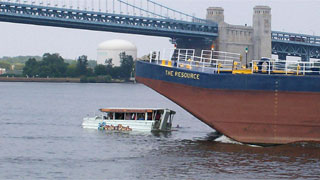
Technology on Ships Can be Dangerous, Warns P&I Club
THE London P&I Club has warned what many of us already know: that improvements in telecommunications technology on board ships can create unwelcome distractions, leading to casualties.

In its StopLoss Bulletin, the club notes that an alleged causative factor in a recent pollution incident involved the duty officer attempting to make a Skype call on his laptop during his watch. A VDR playback revealed that the officer of the watch (OOW) was listening to a news bulletin from his home country which was being streamed through a laptop computer. The officer appears to have missed a radar target and a VHF warning call while listening to the breaking news from home.
The club says, “Onboard communication has improved significantly over the last few years, with technological advances enabling crew to use mobile phones and laptops to stay in contact with family and friends ashore. However, the use of such equipment at inappropriate moments may distract crew from the navigation or operation of the ship.
“Another issue is the risk of being exposed to excessive information and simply being unable to process it all. Bridge equipment is increasingly sophisticated and it can provide the crew with access to extensive information regarding the relative positions of other ships. But, unless it is used in a focused manner, it can confuse, rather than clarify, and ultimately prove counter-productive.”
In another case cited by the club, the OOW decided to use the Automatic Radar Plotting Aid to track 99 different ships whilst transiting a congested anchorage and to overlay the radar image with Automatic Identification System data. With so much information being displayed, he failed to notice that one of the targets had both a minimal closest point of approach (CPA) and time to CPA and, ultimately, there was a collision.
The club says, “It is worth giving careful thought to how such equipment can best be used without risking information overload. An important principle of keeping a safe navigational watch is that the OOW ensures that an efficient look-out is maintained at all times and the Collision Regulations are complied with. It is therefore essential that any distractions from those duties are as far as possible minimised or eliminated.”

Subscribe for Daily Maritime Insights
Sign up for gCaptain’s newsletter and never miss an update
— trusted by our 109,081 members

Get The Industry’s Go-To News
Subscribe to gCaptain Daily and stay informed with the latest global maritime and offshore news

 Join The Club
Join The Club








